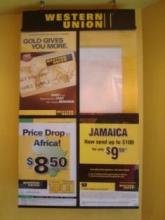Money Transfer Businesses
From Seminar 2: The Peopling of New York City
Contents |
Overview
Money transfer is very important in facilitating transnational social relations. It allows Caribbean immigrants to stay in touch with families in the West Indies and assist them financially. Billions of dollars leave the United States to go to the Caribbean every year through remittances. During our field trip, our group walked along Church avenue, where money transfer companies are ubiquitous. We visited two money transfer businesses, the Western Union, under Grace Kennedy Remittance Service Limited, and CAM, both of which were very busy and had lines with a significant amount of people. Money transfer service allows migrant workers to send money to the Caribbean, which in turn, deepens transnational social relations. In addition, transnational connection produces substantial amount of capital that flows into countries of the Caribbean from the United States.
Remittances
Remittances are money sent by migrant workers abroad to their "home" country. Sending family remittances is a very common transnational practice among Caribbean migrants, and it affects both the economies of sending and receiving countries. Generally, the amount of remittances ranges from $100 to $300 at a time. Because of commitments to their families, many migrant workers send remittances on a regular basis. . According to website of the Inter-American Development Bank [1] , almost three quarters of the remittances to the Caribbean are sent from the United States. Remittances is vital to the Caribbean economies, especially to smaller and less affluent countries. Haiti, for example, received more than one billion dollars of remittances; this amount is more than one quarter of its gross domestic product.
Beside family remittances, there are also remittances that are sent to support local communities in the Caribbean. Caribbean remittances senders in the United State have formed numerous hometown associations(HTAS). These organizations assemble money contributed by supporters to give charitable aid or make investment. Through hometown associations, migrants make donations that are used to build churches, or purchase materials used for religious celebration. Remittances also improve the infrastructure of local communities, such as constructing the streets, parks, libraries and other facilities. Hometown associations exemplifies the impact of remittances from United States on social development of the Caribbean countries.
Western Union
Western Union, located at 887 Utica Avenue of Brooklyn, is a money transfer company. It works in conjunction with Grace, Kennedy Remittance Services Limited, which is associated with Grace Foods---a Jamaican based transnational Caribbean food dealer. Founded in Jamaica in 1990, the Grace, Kennedy Remittance Services Limited, together with Western Union expanded their service to Trinidad and Tobago, and Guyana. It provides various transactional services, including money transfer, bill payment, internet access, mail box order, courier services and others. Furthermore, in this specific Western Union, customers can order groceries at Super Plus Food Store for their families and friends back in Jamaica for only $7. This kind of service are designed to specifically to suit the needs of Caribbean customers.
According to Zenobia McNally, a neighborhood activist, the cultural elements of the Western Union in Flatbush helps bring the feelings of the islands into the neighborhood. Most of the people who work there are from Haiti, Guyana and Jamaica, because these native speakers make it easier for the customer to do business, who feel more comfortable speaking their own dialect. The manager of the Western Union has also commented on the money transfer business, saying that it has grown exponentially over the years because of the increasingly diasporic Caribbean population.
Caribbean Air Mail (CAM)
According to the owner of CAM, the business has been serving the community for 22 years. It allows people to send money to relatives in Haiti, Jamaica and Canada. It also allows money to transfer between the United States and Canada to service the interactions between the two transmigrant communities. This movement of capital between New York City and West Indies made possible by money transfer businesses is another factor of transnationalism because not only does transnationalism encompass the ties back home but also the ties formed between families in different localities.
The West Indian community in Flatbush usually sends back remittances once a month on average, and their family back in the West Indies are dependent on these remittances. Thus, these remittances are very important to the individual Caribbean economy as well as the local community of Flatbush.
Money transfer businesses serve the transmigrant community greatly because they allows families to stay in touch and inform each other of what is happening back in the country from which they came from. In other words, it makes it possible for them to maintain the bonds to their homeland in this fashion.
Works Cited
Glick Schiller, Nina, Linda Basch, and Christina Szanton Blanc. 1995. “From Immigrant to Transmigrant: Theorizing Transitional Migration”. Anthropological Quarterly 68 (1): 48-63
Orozco, Manuel. "Globalization and Migration: The Impact of Family Remittances in Latin America." Latin American Politics and Society, Vol. 44, No. 2, 2002: 41-66.
"Remittances to Latin American and Caribbean countries topped $45 billion in 2004 ." 22 March 2005. http://www.iadb.org . 4 May 2008.


